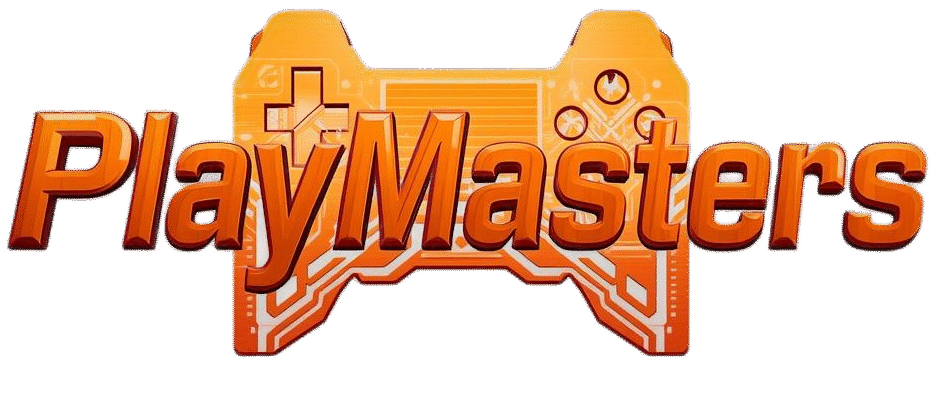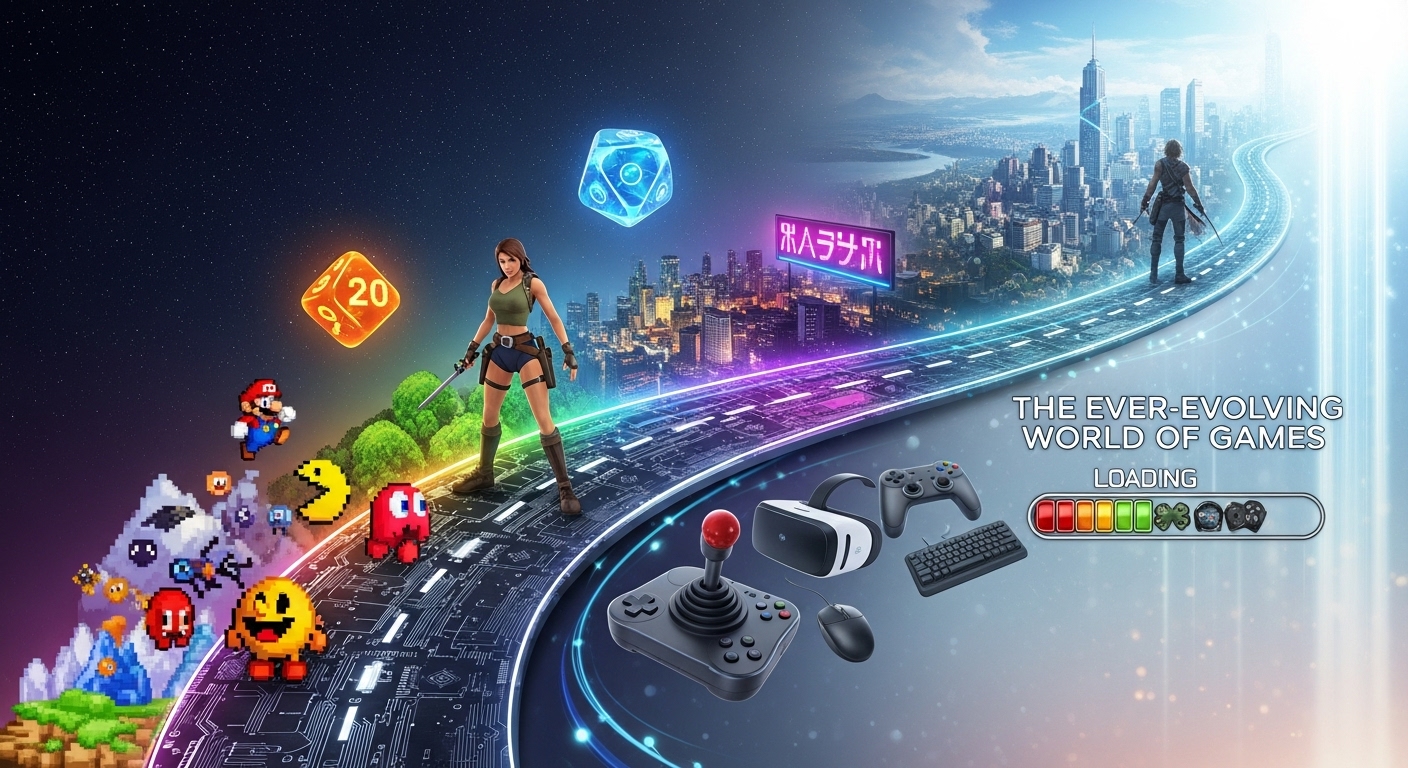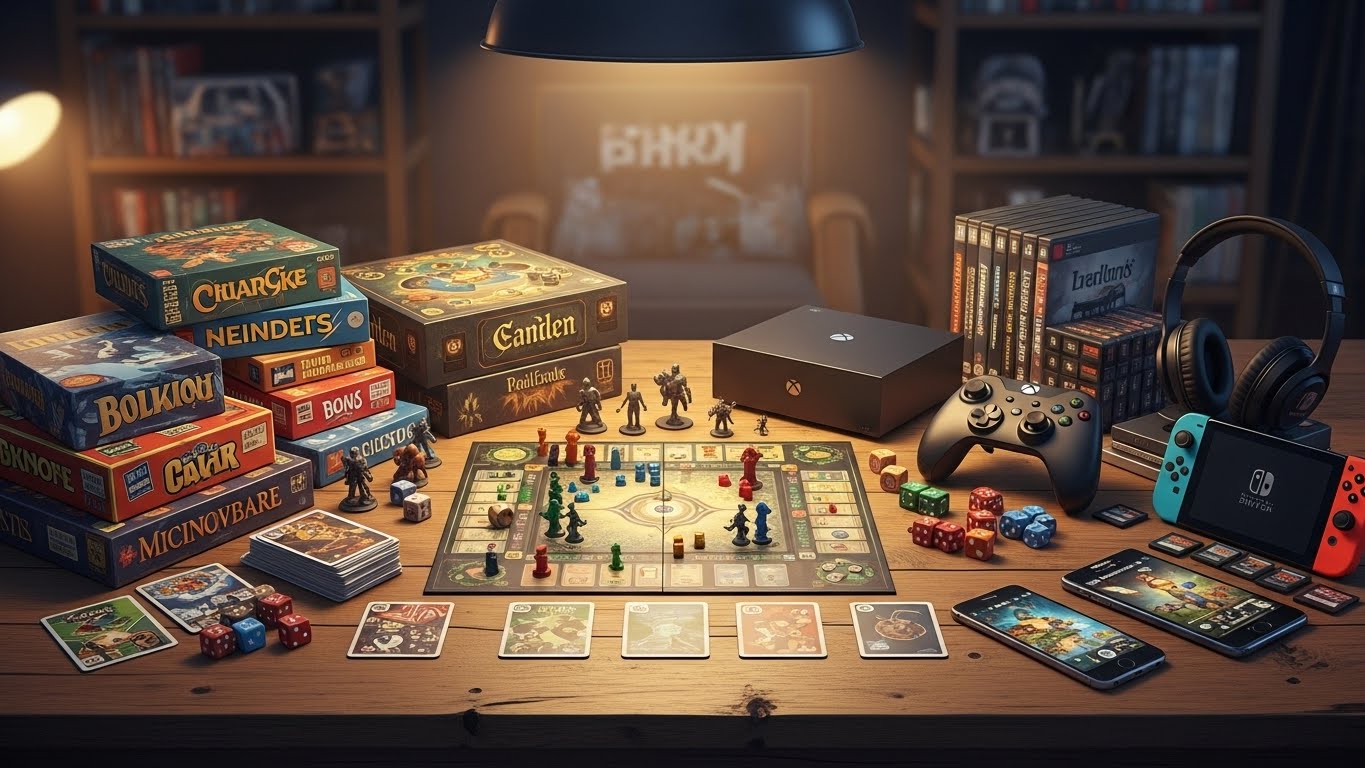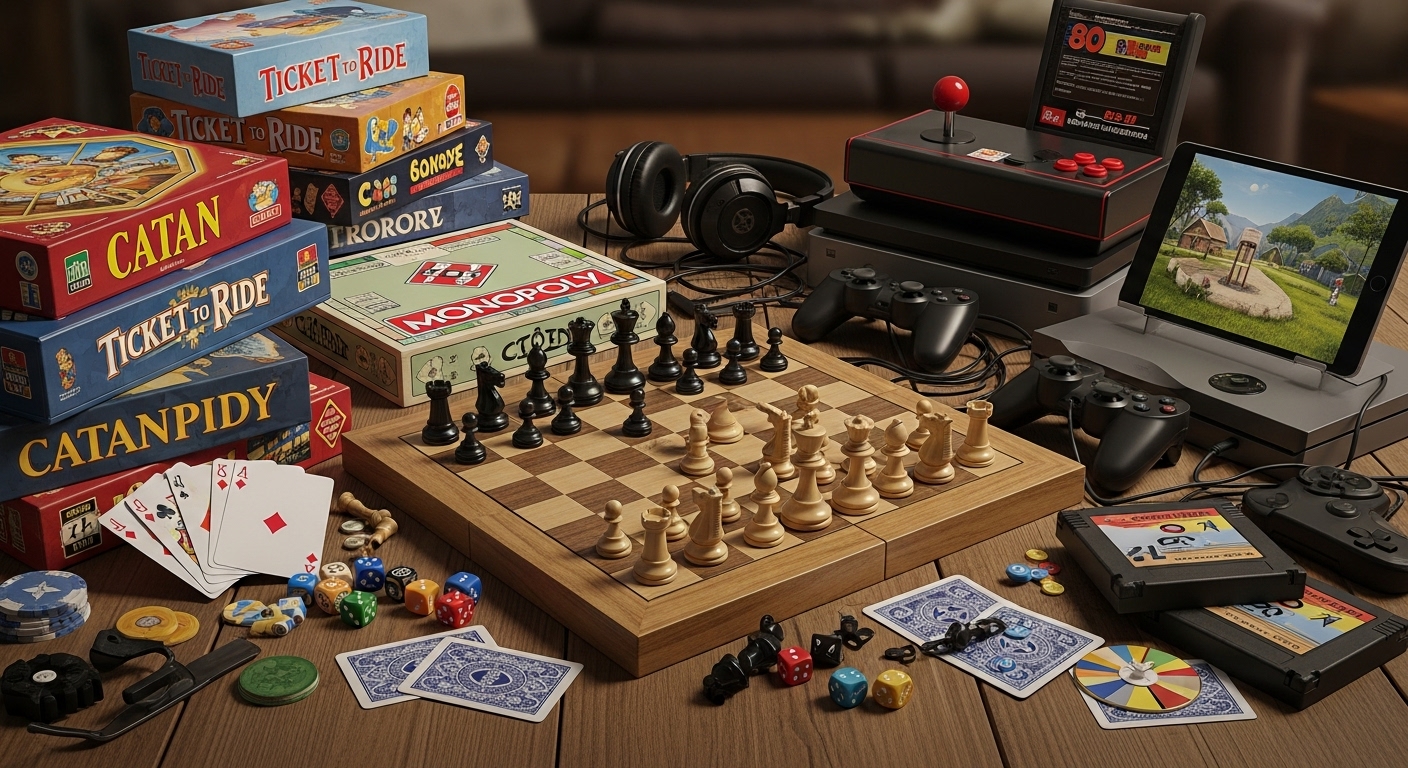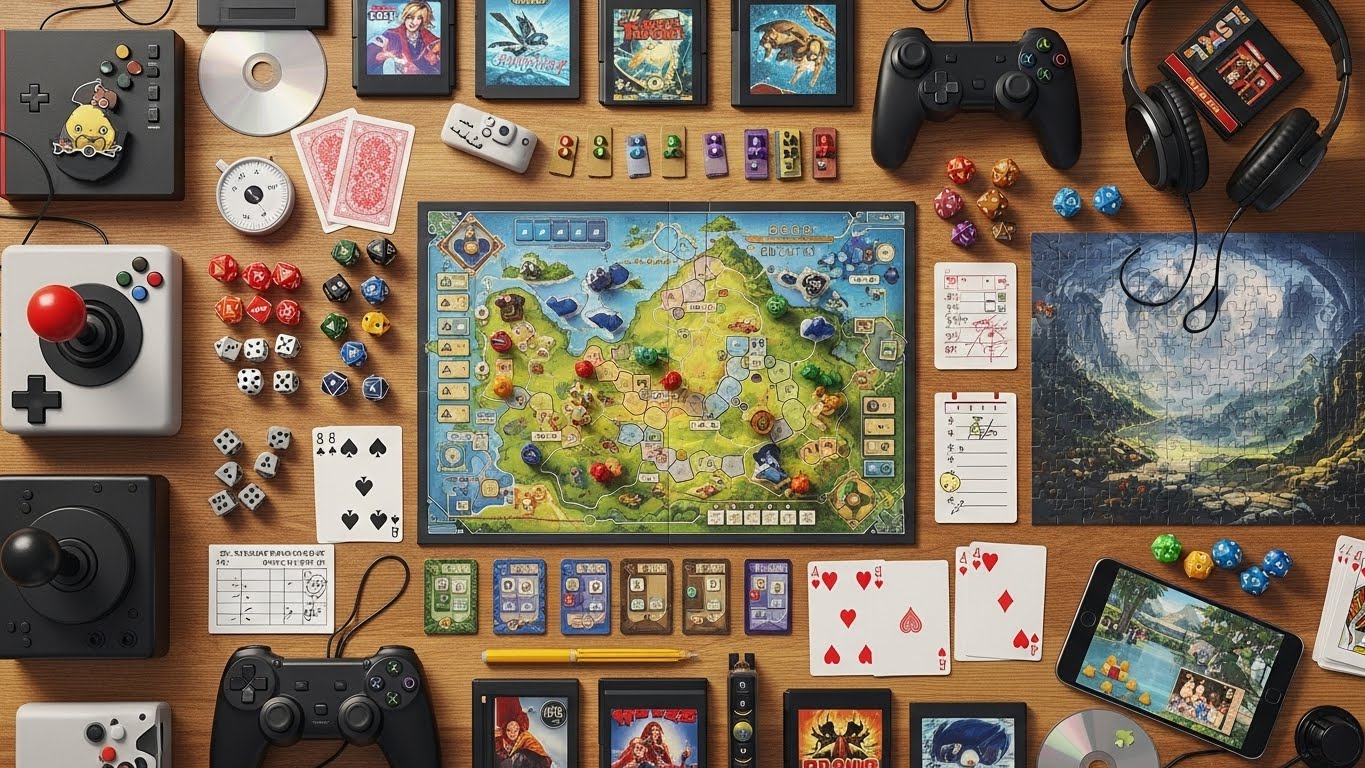Introduction to the World of Games
Games have always been an essential part of human culture. From the earliest board games played by ancient civilizations to the advanced digital worlds we explore today, games have been a way for people to express creativity, compete, and connect with others. They are not just a means of entertainment but also a reflection of human intelligence and imagination. Whether played on a playground, a chessboard, or a computer screen, games shape our lives in ways we often overlook. They build skills, foster teamwork, teach patience, and ignite the spirit of exploration.
The Ancient Roots of Gaming
The concept of gaming is not new. Thousands of years ago, ancient societies were already playing games for recreation, strategy, and learning. The Egyptians played Senet, a board game dating back to 3100 BC, which represented the journey of the soul to the afterlife. In ancient China, Go was a game of deep strategy that trained players to think ahead and control territory. Similarly, games like Mancala originated in Africa, teaching counting and planning skills. These early games laid the foundation for the modern understanding of strategy, logic, and chance. They also served as social activities, allowing people to connect across generations and share common experiences.
The Evolution of Traditional Games
As societies evolved, so did the nature of their games. Card games, dice games, and sports all became integral parts of culture. Chess, which originated in India as Chaturanga, became a global symbol of intelligence and strategy. It was not just a pastime but also a tool used by military leaders to simulate battles and improve their tactical thinking. Similarly, sports like football, cricket, and basketball evolved from simple physical activities to organized, rule-based competitions that bring millions together. Traditional games continue to exist alongside modern entertainment, reminding us of the simplicity and joy found in human interaction without digital interference.
The Birth of Video Games
The 20th century revolutionized the concept of gaming. With the invention of computers and electronic devices, a new form of play emerged — video games. The earliest video games were simple experiments created by programmers who wanted to push technology beyond its limits. Games like Pong, released in the early 1970s, marked the beginning of a new era. It was a simple tennis simulation with two paddles and a ball, but it captured the imagination of millions. Soon, arcade machines appeared, filling entertainment centers with blinking lights, sounds, and excitement. Titles like Space Invaders, Pac-Man, and Donkey Kong became cultural phenomena, paving the way for the massive gaming industry we see today.
The Golden Age of Consoles
In the 1980s and 1990s, video games entered households around the world. Companies like Nintendo, Sega, and Sony transformed the entertainment landscape. The introduction of the Nintendo Entertainment System brought iconic characters like Mario and Link into our lives. Sega’s Sonic the Hedgehog introduced speed and attitude to gaming, while Sony’s PlayStation elevated games into cinematic experiences. These consoles allowed developers to create expansive worlds, complex stories, and memorable music that players could experience from the comfort of their homes. It was during this era that gaming began to be recognized as a legitimate art form capable of storytelling and emotional depth.
The Rise of PC Gaming
While consoles captured living rooms, personal computers opened new doors for gaming innovation. The flexibility of PCs allowed developers to experiment with different genres, from strategy and simulation to first-person shooters and role-playing games. Games like Doom, Age of Empires, and The Sims showcased the diversity of experiences possible on a computer. PC gaming also introduced multiplayer experiences through local area networks, allowing friends to connect and compete. Later, the rise of the internet took this even further, enabling global connections through online gaming. Players could now collaborate or challenge opponents from different continents, creating virtual communities that transcended physical boundaries.
Online Multiplayer and Social Gaming
The introduction of online multiplayer gaming was one of the biggest turning points in the industry. Games like World of Warcraft, Counter-Strike, and Call of Duty allowed players to immerse themselves in shared worlds filled with competition, cooperation, and communication. Online gaming created digital friendships and rivalries, often as strong as real-world connections. Social games also emerged, allowing casual players to enjoy simple yet addictive experiences. The rise of online gaming gave birth to esports — professional competitive gaming watched by millions worldwide. Today, tournaments fill stadiums, and top players are celebrated as athletes, earning recognition and sponsorships.
Mobile Gaming and the Casual Revolution
The arrival of smartphones brought gaming into everyone’s pocket. No longer limited to dedicated consoles or PCs, people could play anytime and anywhere. Mobile games like Angry Birds, Candy Crush, and Clash of Clans became global sensations, appealing to audiences of all ages. Mobile gaming blurred the line between casual and hardcore players, making games more accessible than ever before. Simple controls, free-to-play models, and constant updates kept players engaged. This accessibility helped expand gaming into one of the largest entertainment industries in the world. Even people who had never considered themselves “gamers” were now spending hours immersed in digital fun.
The Impact of Games on Society
Games are more than just a pastime; they shape culture, influence behavior, and drive technological progress. Educational games teach math, science, and history in engaging ways. Simulation games like Flight Simulator or Minecraft encourage creativity and problem-solving. Strategy games enhance planning and decision-making skills. Even competitive games teach teamwork, focus, and discipline. Beyond entertainment, games also serve as powerful storytelling tools. Titles like The Last of Us, Journey, and Red Dead Redemption explore themes of love, loss, morality, and survival. They create emotional experiences that rival those found in books and films. Through interactive storytelling, players become active participants rather than passive observers.
Psychological Benefits of Gaming
Despite criticism, gaming can have many positive psychological effects when played responsibly. It helps relieve stress, improve coordination, and enhance cognitive flexibility. Puzzle games stimulate problem-solving abilities, while action games sharpen reflexes and attention. Multiplayer games strengthen social skills by encouraging communication and teamwork. Many people use games as an escape from daily pressures, finding comfort and relaxation in virtual worlds. For some, gaming provides a sense of achievement and progress that may be lacking in real life. Researchers have even found that certain games can be therapeutic, helping people cope with anxiety, depression, and trauma.
Challenges and Criticisms in Gaming
However, gaming is not without its challenges. Excessive play can lead to addiction, neglect of responsibilities, and social isolation. Some games contain violent or inappropriate content, raising concerns among parents and educators. The gaming industry has also faced criticism over issues like microtransactions, pay-to-win models, and the exploitation of players. Online toxicity and harassment remain serious problems in gaming communities. Addressing these concerns requires education, moderation, and awareness. Developers and players alike must work together to create safe, inclusive environments where everyone can enjoy games responsibly.
The Artistic Side of Games
Games are a form of art. They combine visual design, music, storytelling, and interactivity into a single experience. Game developers, much like artists and filmmakers, craft worlds that evoke emotion and wonder. From the haunting beauty of Shadow of the Colossus to the pixel charm of Stardew Valley, games express creativity in countless ways. Music in games adds depth and atmosphere, while visual art defines the tone and mood of each adventure. Story-driven games explore complex narratives, moral choices, and character development. The artistry of gaming lies in its ability to engage both the mind and the heart simultaneously.
Esports: The Modern Competitive Arena
Competitive gaming, or esports, has become one of the fastest-growing forms of entertainment in the world. Professional players train for hours, developing strategies and precision comparable to traditional athletes. Games like Dota 2, League of Legends, and Fortnite host global tournaments with massive prize pools. Esports teams have sponsors, coaches, and millions of fans. Streaming platforms allow audiences to watch live matches, transforming gaming into a spectator sport. This rise has also created career opportunities for commentators, analysts, and content creators. Esports has proven that gaming is not just a hobby but a profession that demands dedication and skill.
Virtual Reality and the Future of Immersive Gaming
The future of gaming lies in immersion. Virtual reality (VR) and augmented reality (AR) technologies are changing how we experience digital worlds. VR headsets transport players into 360-degree environments where they can interact naturally. Games like Beat Saber and Half-Life: Alyx showcase how VR can blend physical movement with virtual exploration. Meanwhile, AR integrates digital elements into the real world, as seen in mobile games that encourage outdoor play. These technologies are pushing boundaries, creating experiences once thought impossible. As hardware improves, the line between reality and virtual space will continue to blur, opening new frontiers for creativity and play.
The Role of Artificial Intelligence in Games
Artificial intelligence has become a crucial component of modern game design. AI controls enemies, manages difficulty, and even helps generate entire worlds. Dynamic AI systems adapt to player behavior, ensuring that no two playthroughs are the same. In simulation and strategy games, AI opponents challenge players to think critically. Beyond gameplay, AI also assists developers by automating design tasks and testing game mechanics. Future AI could enable more personalized gaming experiences, where characters respond emotionally to the player’s decisions. As technology advances, AI will continue to make games smarter, more dynamic, and more lifelike.
Indie Games and Creative Freedom
Independent developers, or “indie” creators, have brought new life to the gaming industry. Without the constraints of large studios, they experiment with unique ideas, art styles, and narratives. Games like Undertale, Hollow Knight, and Celeste prove that creativity often shines brightest outside the mainstream. Indie developers often focus on emotional storytelling, artistic design, or innovative gameplay mechanics. Their work inspires major studios to take risks and innovate. The rise of indie games demonstrates that passion and imagination can rival budgets and marketing, reminding us that at its heart, gaming is about creativity and connection.
Games as a Tool for Learning and Development
Educators have embraced games as effective teaching tools. Educational games make learning interactive and engaging, turning abstract concepts into hands-on experiences. Children learn mathematics through puzzles, history through simulations, and science through experimentation. Games also encourage problem-solving, perseverance, and collaboration — essential life skills. In professional fields, simulation games are used for training pilots, doctors, and engineers. Even language learning apps use gamified systems to motivate progress. By combining fun with education, games make learning a lifelong adventure.
Community and Connection Through Games
One of the most powerful aspects of gaming is its ability to connect people. Online communities bring together individuals from different cultures and backgrounds. Players collaborate in guilds, share strategies on forums, and celebrate their favorite titles together. Games can build friendships, strengthen family bonds, and bridge generational gaps. In times of isolation, such as during global events that limit physical contact, gaming provides a sense of community and belonging. It reminds us that play is universal, and connection can be found even in virtual spaces.
The Future of Games and Human Imagination
As technology continues to advance, the potential of games grows endlessly. Artificial intelligence, virtual reality, cloud gaming, and metaverse concepts are shaping the next generation of interactive experiences. Future games may combine realism, emotion, and creativity in ways we cannot yet imagine. What remains constant, however, is the human desire to play. From rolling dice to exploring galaxies, the essence of gaming lies in curiosity and fun. It is a celebration of imagination, innovation, and connection — a universal language that transcends barriers of age, culture, and geography.
Conclusion
Games are more than entertainment; they are reflections of who we are. They teach, challenge, and inspire. From ancient boards to digital worlds, the evolution of games mirrors the progress of human civilization itself. Every generation finds new ways to play, to dream, and to connect through games. As we look toward the future, one truth remains clear: the spirit of play will always be part of the human story. Gaming continues to evolve, but its heart remains the same — the joy of discovery, the thrill of challenge, and the power of imagination that unites us all.
